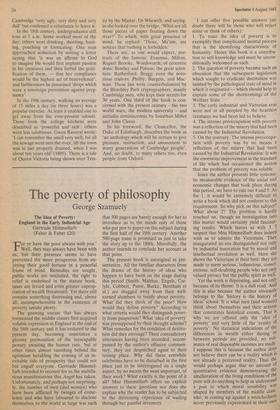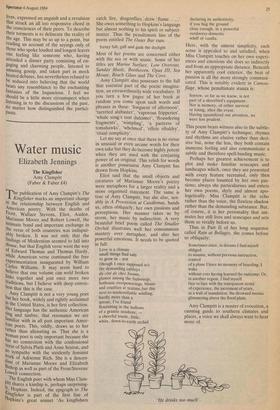The poverty of philosophy
George Szamuely
The Idea of Poverty: England in the Early Industrial Age Gertrude Himmelfarb (Faber & Faber f20) or ye have the poor always with you.'
Well, they may always have been with us, but their presence seems to have prevented the more prosperous from en- joying their good fortune in a peaceful frame of mind. Remedies are sought, public works are instituted, the right to relief is enshrined in the statute book, taxes are levied and even greater exprop- riation of wealth threatened. Yet there still remains something distressing and, above all, incomprehensible in the existence of poverty amidst plenty.
The gnawing unease that has always tormented the middle classes first acquired voluble expression in England at the end of the 18th century and it has endured to the present day, becoming sometimes a gloomy premonition of the inescapable penury awaiting the human race, but at other times almost vanishing behind the optimism heralding the coming of an in- evitable tide of prosperity that could not but engulf everyone. Gertrude Himmel- farb intended to recount for us the multifa- rious manifestations this Angst has taken. Unfortunately, and perhaps not surprising- ly, the number of men (and women) who have been afflicted by twinges of consc- ience and who have laboured to disclose themselves to the world at large was such
that 500 pages are barely enough for her to introduce us to the minds only of those who put pen to paper on this subject during the first half, of the 19th century. Another 500-page tome is promised us just to take the story up to the 1880s. Mercifully, the author intends to conclude her account at that point.
The present book is unoriginal in pre- sentation. All the familiar characters from the drama of the history of ideas who happen to have been on the stage during this period (Smith, Malthus, Engels, Car- lyle, Cobbett, Paine, Burke, Bentham et al.) are dragged away from their well- earned slumbers to testify about poverty. What did they think of the poor? How would they define poverty? According to what criteria would they distinguish pover- ty from pauperism? What 'idea of poverty' was presupposed by their thought scheme? What remedies for the condition of destitu- tion did they envisage? Their contradictory utterances having been recorded, accom- panied by the author's effusive commen- tary, they are despatched again to their resting place. Why did these erstwhile celebrities have to be disturbed in the first place just to be interrogated on a single aspect, by no means the most important, of their work? What exactly is the point of it all? Miss Himmelfarb offers no explicit answers to these questions nor does she explain why the reader has to be subjected to the distressing experience of wading through her painful inventory. I can offer five possible answers (no doubt there will be .those who will reject some or think of others): 1. To trace the idea of poverty is to exemplify that complicated mental process that is the identifying characteristic of humanity. Hence this book is a contribu- tion to self-knowledge and must be uncon- ditionally welcomed as such.
2. The question of poverty became such an obsession that the subsequent legislation which sought to eradicate destitution was tainted by the pathological state of mind in which it originated — which should help to explain some of the shortcomings of the Welfare State.
3. The early industrial and Victorian eras were not at all peopled by the heartless creatures we had been led to believe.
4. The intense preoccupation with poverty was a reflection of the misery that had been caused by the Industrial Revolution.
5. On the contrary. The intense preoccupa- tion with poverty was by no means a reflection of the misery that had been caused by the Industrial Revolution. It was the enormous improvement in the standard of life which had occasioned the notion that the problem of poverty was soluble.
Since the author presents little systema- tic measurable evidence of the social and economic changes that took place during this period, we have to rule out 4 and 5. As for 1, it would be extremely difficult to write a book which did not conform to this requirement. So why pick on this subject? What about 2? The problem is hardly touched on, though an investigation into this matter would certainly yield fascinat- ing results. Which leaves us with 3. I suspect that Miss Himmelfarb does indeed wish us to admire the Victorians. They inaugurated an era distinguished not only by industrial innovation but by moral and intellectual revolution as well. Here she shows the Victorians at their best: they are made to seem serious, industrious, consci- entious, self-doubting people who not only valued privacy but the public spirit as well Yet the work is depressing, and not only because of its theme. It is a dull read. And this is also because the author obviously belongs to the 'history is the history of ideas' school. It is what men (and women) think about themselves and their actions that constitutes historical events, That Is• why we are offered only the 'idea of poverty' and very little of the 'reality of poverty'. No statistical indications of the differences in wealth either during or between periods are provided, no esti- mates of real disposable incomes are made. I suppose this is because the author does not believe there can be a reality which is not already a perceived reality. Thus she would perhaps argue that no amount of quantitative evidence demonstrating the amelioration of the living conditions of the poor will do anything to help us understand a past in which moral sensibility was shaped by members of the middle class, who, in coming up against a wretchedness never previously experienced in their own
lives, expressed an anguish and a revulsion that struck an all too responsive chord in the consciences of their peers. To describe their torments is to delineate the reality of the age. This may be so up to a point, but reading an account of the sayings only of those who spoke loudest and longest leaves one feeling like someone who, having attended a dinner party consisting of en- gaging and charming people, listened to amusing gossip, and taken part in mock heated debates, has nevertheless refused to be seduced into believing that the world bears any resemblance to the enchanting fantasies of the loquacious. I feel we should be a little more circumspect when listening in to the discussions of the past, no matter how distinguished the partici- pants.







































 Previous page
Previous page